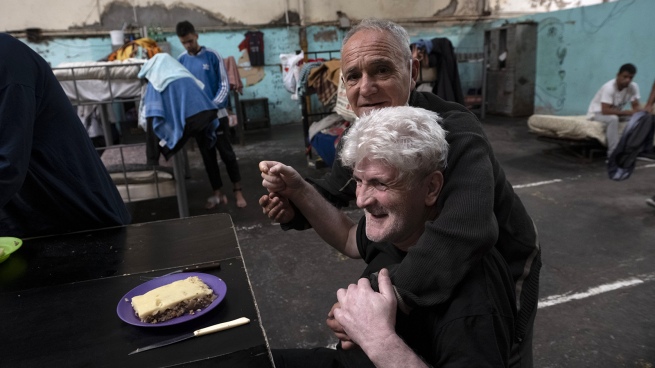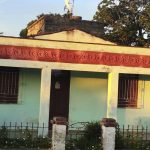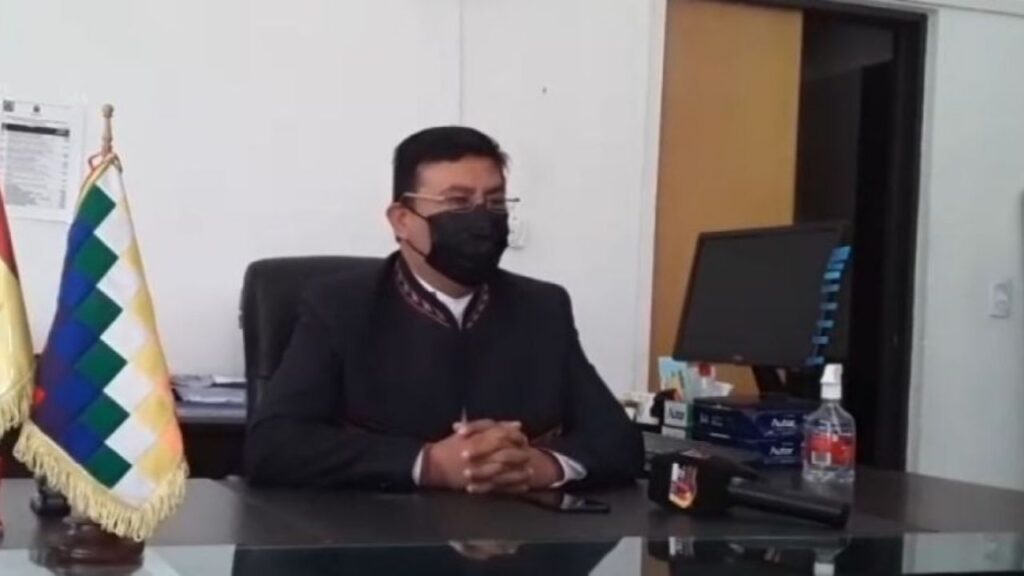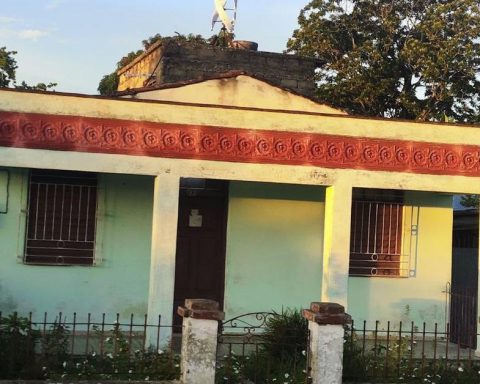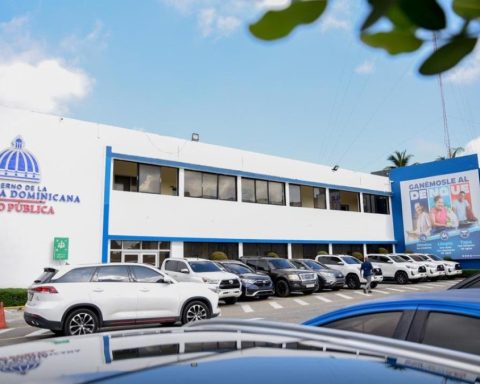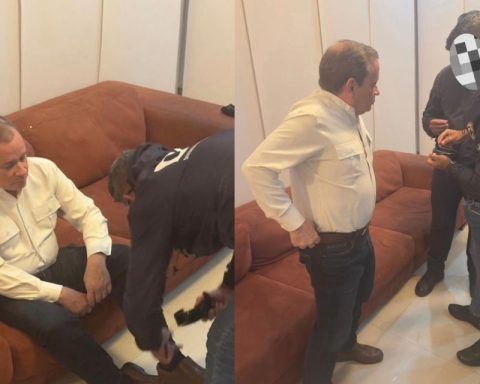When there is a will, there are a thousand tools. When there is no will, there are a thousand excuses.
That text was posted at the headquarters of the Tupac Amaru organization when Milagro Sala enjoyed freedom and it applies to almost all situations of life and institutions, including the history of what is now the Monteagudo Comprehensive Center, which was a refuge for homeless men managed by the Buenos Aires government and that this week turned 11 years old managed by Horacio Ávila, head of Project 7, an organization that deals with comprehensive care for people living on the street.
Horacio himself lived several years outdoors in what he defines as “another life” and he had to witness the famous snowfall of July 9, 2007 in those circumstances.

“The hurt, hurts”, is one of the phrases that can be read on the door of Monteagudo, but it was not the case of Horacio, who defines himself as a survivor. He says that for him dignity “is everything” and he is clearly one of those fighters who, like salmon, swim against the current.
Getting to know Monteagudo generates joy and impotence at the same time: the joy of knowing that when there is love things can be done well and the sadness of knowing how the rest of the “shelters” for homeless people managed by the Buenos Aires government work. .

The day and the night
Unlike the rest of the shelters, in Monteagudo (which is a comprehensive center) homeless people work and not outside employees. It was one of the first decisions Ávila made.
Another is that they give those who live there or spend the day four meals (in the shelters they offer only breakfast and dinner) and those who live there, even if they are encouraged to have jobs outside and study, are not obliged to leave the institution. at six in the morning, as in the rest of the homes. That is why there, despite the life that touched them, those who are grateful for the dignity in the treatment and get along with each other.

“People are treated like people”
“The main difference is conceptual, here people are treated as people. Just when I entered I saw the dog of one of the companions who are here, that would never be allowed in the shelters, ”he told Télam.
Alejandro Becerra is one of the men who lives and works at the care center.
“You have to deal with many situations with people when they arrive. There are people who cry, we are psychologists without being. In addition, those of the City government are inns. In the morning you have to go. And this is an integration center, we try to get them papers, we try to get them to study. And they have their stories well kept, it is not easy for them to tell. But over time they take baths, they cut their hair, ”she says.

Eduardo is 45 years old and has been in Monteagudo since 2017. Some time before his house was robbed and his life was miraculously saved. And in Lomas de Zamora he felt that they were going to kill him.
For a time he was able to pay rent, but it began to get complicated and he ended up in that center, where he says he did not want to work, but they went to look for him three times. “I wanted to work for something else, but I started to like it and I think now I don’t want another job”, because “I like to take care of people and just looking at them I realize the need of each one”, he says.
José Luis Santa Cruz explains that there are 160 people in the center and that the pandemic was terrible, that it was full. Its history is unique like all of them, and like all of them it has points of contact with the others.
“I was always on the street and I was sleeping in the Ramos Mejía Hospital and an acquaintance of Horacio sent me here. And here I stayed, I realized that there were people who had more problems than me, for example lack of legs and arms. I always helped. I came to the street because I separated in 2019 and I left the house to my partner. I had to go to a hostel. I worked in the Meteorological Service and when Macri took over he cut us to hell.

The first night, the worst night
All those who lived on the street agree that the hardest part is getting through the first night. That does not sleep. Because you are thinking about too many things and you don’t understand anything.
“Then the days go by and your legs begin to weigh you down, you walk like a lame. Because you don’t have a bra. There are people who end up committing suicide or dying. After you end up living on the street you end up doing anything, the hurt hurts. There are people who survive and people who don’t, ”she assures.

The rules of coexistence
Monteagudo has rules. There can be no fights. No one who is consuming drugs or alcohol can enter or get high while inside. They also teach those who enter not to “track”, that is, not to steal other people’s belongings.
The one about drugs was a strong fight that Ávila gave at the beginning because when the center passed into the hands of Project 7, the “transas” made their mouths water.
“We had to go out every night for a long time to run to the transas to tell them that they were not going to sell drugs here. In a moment, they understood. Imagine, for them it was the ideal clientele. They wanted to buy the place, they came to play nice, to have barbecues and want to set up a grill when in reality what they wanted was to sell drugs. I had death threats: once one came to the rockets and we were saved from fart and we found out that in the lower Flores they had put 80 lucas to put it on me. Annoying those who want to sell drugs or soldiers to sell. But there were also drug traffickers who promised me that no one was going to touch us,” recalls Ávila.
Fito Páez and the Liberated City
In a visit that Fito Páez once made to Monteagudo, he was so impressed that he was inspired and wrote the song La Ciudad Liberada.
To this day, Fito continues to put money into the institution, which is financed a little with the contribution of CABA and a lot with that of supportive people who believe in Horacio Ávila’s project. Whoever wants to collaborate, has only to enter the social networks of Project 7.
The Liberated City
In Patrick Park
The city of Buenos Aires
There is a shelter
For the people who have no one
live and die on the street
I was always happy there
live and die on the street
What delirium without you
You’re in the skull club
In the Monteagudo refuge they embrace you with their hearts
I went to sing one night with the piano
And a sign written with pain said
That the street is not a good place to live
Much less to die
Pass it on, pass it on
A man named Horacio Ávila
He knows that because of his history he could be resentful. But he is not: he is a fighter. One of those people who, instead of reproducing the evil and indifference of those who were victims of evil and indifference, dedicated her life to trying to help those who are going through the same thing.
Télam: If you go out for a drink and they ask you for money or they sell you something. One comes, two come, five come. How many do you give?
Horacio Ávila: I give until I have enough money. But there are things that bother me a lot and I tell them to my colleagues from the place that I think I have earned. It annoys me when they come to ask with pity. And I don’t buy them. I tell them that if they are going to sell or beg, do it with dignity. Have everything or have nothing. Dignity is everything.
T: Why does an important part of society not only make invisible, but despise those who live on the street?
HÁ: The vision that people have about us is very bad in general. It is the same as there is on the poor, on the black villero, on the little ball. For a long time insecurity was attributed to us. If we have that power, Larreta has to go.

T: And did you ever think that the middle class doesn’t look at them for fear of living on the street? Technically, the street is closer than the country for a salaryman.
HA: There may be a mirror issue, yes. But I think most of them don’t look at us because they’re so focused on surviving. There are many ways to try to survive. One is that of those who live on the street and another, although they may not realize it, that of people who have a roof over their heads and a job, but are still in a situation of immense fragility. Then they continue. They walk past a dead guy and keep going. There are more and more headphones for that. The system promotes it. Because if you stop and look, I don’t know if you can take it.
The sad stories that we live are stories of sadness with dignity: we have 78 dead comrades, but we were able to give them a decent burial, a burial and that there is no common grave. There is a sector of Chacarita in the background that is practically ours.
Uncle Lucas, a very dear guy, recently passed away from cardiac arrest. And Gerardo Salinas, who has been with us from the beginning, also left. They are deaths that hurt a lot. I don’t believe in God, but I believe in a lot of things.

T: What sucks more? That they don’t buy you anything or they don’t give you money or that they ignore you?
HA: Being ignored. Even the one who looks at you with contempt or steps on your blanket gives you existence.
T: In 11 years there must also be happy stories…
HA: A lot. I always remember a very exciting one. Carlitos started elementary school at Bernasconi at 50-odd. The guy was a bard and one day I was sitting here and he came in with his first grade folder with the first letters that he had written. And he was flagged.
T: You don’t believe in God. But if you existed, what would you tell him?
HA: I am an anarchist to be able to argue with arguments. I would tell him that if he made us in his image and likeness, he should go to a psychiatrist. It is also said that God and the Devil are the same thing. And that approach closes me a lot because we all have good parts and bad parts. That approach closes me a lot, but if God exists, he is leaning too much towards the bad.
